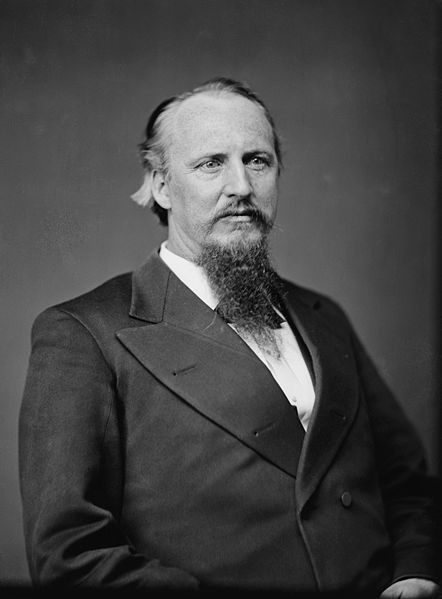Legislation also gave me a rather large interesting tidbit: the transcripts of the Senate debate on the Army Nurses Pension Act.
The Pension Act was submitted previously in 1890 and passed the Senate before getting hung up in the House. In July, 1892, the House finally passed its own amended version and sent it to the Senate for consideration. This is where the transcript begins.
Our leading men:
 |
| Senator Davis |
Senator James Henderson Berry: one of two men heading the opposition. A Democrat from Arkansas and a former Confederate soldier (he served in the 16th Arkansas as a 2nd Lieut.).
Senator Francis Marion Cockrell: a Democratic senator from Missouri and the other major source of opposition to the bill, Cockrell was also a brigadier in the Confederate army.
Berry and Cockrell, along with Senator Gray (D-De), had several issues with the bill. Berry summed it up in two short sentances: "It seems to me...that there can be no justice in placing persons upon the pension roll who were not soldiers, but were simply nurses during the late war. I cannot see by what rule of justice or equity a claimant can be put upon the pension roll and continued there to increase the enormous pension list whcih we already have." Army nurses, he argued, had not, as a body, exposed themselves to danger any more than nurses did in modern hospitals. They were not "actual soldiers" and therefore not entitled to be on the pension roll. "Service pensions," and the dangerous precedents they set for future legislation, were an evil to be avoided at all costs. Berry et co. also worried about the strain on the national budget. The Act would cover far more than the two or three hundred that Mr. Davis insisted it would cover: 6284 women, according to Mr. Cockrell's numbers (personally, I'm inclined to agree with Mr. Cockrell on this point--the numbers, not the strain). As a bit of background, pensions were already costing the government $150,000,000 a year. Now, pensioning 6000 old women was not the financial drain these men were worried about--the precedent the bill set, however, for more and more pensions, was.
 |
| Senator Cockrell |
And, despite all they'd done to hedge the bill, they still fought for its dismissal. Luckily for the nurses, their objections were overruled. The House and the Senate created a committee to settle the disagreement over the amendment (the House's bill didn't have Cockrell's changes), and the bill was signed, as amended, by the Senate on August 1, 1892. The Army Nurses Pension Act officially became law four days later.
So, the transcript's not a goldmine of information, but it makes a fantastic starting point. It looks like there's a divide along party lines--not surprising--but a list of who voted for and against the bill is now on my list of things to look out for. Also, I now have the names of the major players. If I can get my hands on some personal papers, I might be able to sound out what their not-so-obvious views on the Pension Act were, and what was going on behind the scenes. I can backtrack to when the first Special Acts started coming through--those oh so evil Special Acts that Cockrell and Berry dislike so much--and see what their reaction is. Davis also mentions in the debates that he spoke with Clara Barton the morning the bill went before the Senate. His papers could have more tidbits about who's talking about the Pension Act, who's lobbying for it, etc.
This may take longer than five weeks...
No comments:
Post a Comment